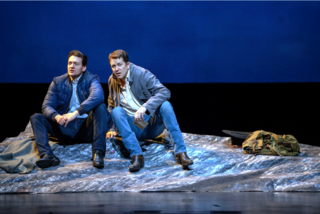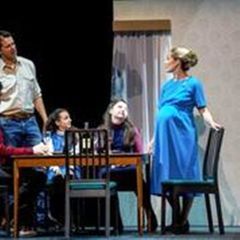|
Back
Emotions on the High Ground New York
Rose Theater, Lincoln Center
05/31/2018 - & June 2, 3, 4, 2018
Charles Wuorinen: Brokeback Mountain
Daniel Okulitch (Ennis Del Mar), Glenn Seven Allen (Jack Twist), Heather Buck (Alma Beers), Hilary Ginther (Lureen), Christopher Job (Aguirre), Brian Kontes (Hogboy), Kristee Haney (Mrs. Beers), Kevin Courtemanche (John Twist Sr.), Jenni Bank (Mrs. Twist), Melissa Parks (Bartender), Sarah Heltzel (Saleswoman), Daria Capasso (Alma Jr), Isabella Sorkin (Francine)
New York City Opera Chorus, New York City Opera Supernumeraries, New York City Opera Orchestra, Kazem Abdullah (Conductor)
Jacopo Sirei (Stage Director), Eva Musil (Scenery and Costume Designer), Susan Roth (Lighting Designer)

G. S. Allen, D. Okulitch (© Sarah Shatz)
“Have they no cake? Let them eat lawsuits!.”
United States Supreme Court decision defending caterers who don’t wish to cater to gay couples, June 4, 2018, 10.30 am
A few hours after reeling from this third performance of Charles Wuorinen’s Brokeback Mountain, the latest decision from our Most August Judicial Body showed that bigotry is not even comatose in America. It is alive and well. And that prejudice–whether at a confectionary or a coffeeshop –is, after 242 years, still a part of the American tapestry.
Mr. Wuorinen in an interview had said that Brokeback Mountain was less about gay prejudice than about the loneliness of people who are not allowed to pursue the life they need. And indeed, two words repeated several times in the opera, “Isolation” and “Freedom” are testament to his values.
Yet one still cannot deny that while Brokeback Mountain is a period piece and a space piece–the 1960’s in Wyoming–its power and depth still can affect us all. No, Annie Proulx did not construct a screed in the story, Ang Lee did not film a declaration in his visually arresting film, and Charles Wuorinen didn’t compose a set of anthems for Gay Pride. On the other hand, the story probably won’t be broadcast by the Laramie Opera House for several years. Though perhaps (hope runs eternal) I am wrong.
Onto the opera itself. It is more spare than the original New Yorker story, but it is also far far more blatant. Two Wyoming cowboys are employed to guard a flock of sheep on Brokeback Mountain, one to do the actual guarding against coyotes all night long, the other to mind the camp below. Within a few days, they are both staying together. And both half-heartedly declare that “we ain’t queers.”
Still, they find comfort with themselves, comfort leading to real feeling, even real love. When they leave, to marry, to settle down, to have kids, the taciturn Ennis (Daniel Okulitch) and the outgoing Jack (Glenn Seven Allen) have mixed feelings. That, in Act One, is done seamlessly, with hardly a change in scenery, the two black ridges emblematic of the “hateful” mountain interspersed with a bar, a dress-shop with Ennis’s chattery fiancée (Heather Buck) looking for her wedding dress.
Act II is not seamless all, with frequent changes of scenery. At the same time, it builds up, with both men seeing each other, keeping secrets from their wives and finally, with the death of Jack, Ennis realizes that his life had been needlessly lonely.
One must first laud the settings and direction of this opera. Amidst the huge stage of the Rose Theater, the characters could seem diminished. Yet the backgrounds are so spare that their movements are sharp, focused, we never ever lose sight of their actions and nonactions. Act I is the more blatant, with both men holding each other, almost plunging into their tent, and–in a crucial moment not explained until the very end–indulging in a blood-fight. If Act II loses the pace through movements of stage apparatus, the libretto is so tight that one rarely realizes it.
Ang Lee’s film of Brokeback Mountain was superb. Yet the romance seemed almost–almost–secondary next to the towering Canadian Rockies, where it was filmed. (The mountain is a fictitious creation of Annie Proulx, though doubtless myriads of gay couples will try to travel there.)
The voices in the opera are unparalleled–and in this setting, created for music, they resonate with emotion, with power, with...yes, the doom of an unfulfilled love. The baritone David Okulitch starts with an almost mumbly conversation, only later breaking into more lyrical passages. It is a voice filled with character. His friend, who is almost unafraid to admit his feelings, is a tenor voice which rings with emotion from the start. Mr. Allen is not afraid to give vent to his feelings. And in the one near-duet of the second act, the two are almost overpowering in their almost verismo passions.
The two wives each have their moments. Hilary Ginther, constantly berating Jack, is sullen, nervous, yet at the end has a soliloquy of great power. Ms. Buck is virtually a harridan in the dress-shop, yet soon we see her as the typical harried housewife. She extols her problems as if feminism never existed. And when her husband goes off to what she suspects will be a tryst with his friend, his only excuse is “finish your ironing.” It is very sad.

K. Abdulla, C. Wuorinen
As for the music, we have a small problem, which is quickly mollified by...well...almost ignoring it.
Ignoring it the same one ignores film background music. I hate to say that for the wondrous Charles Wuorinen, whose tough, massive, difficult music has been at the pinnacle of the American atonal scene.
And yes, atonality has its moments. Perhaps, as in Berg’s Wozzeck, he was using a single tone-row, yet I have doubts. Too much of the constantly dissonant score is tied to the action. A pounding of kettledrums before the first “embrace”, the chattering of woodwinds for the dress-shop scene. The constant growling of trombones when the name Brokeback Mountain is intoned. No arias per se, no leitmotifs that I could discover (though Ennis and Jack seemed to work in different compasses).
Still, to a degree it worked. As background music, the soloists singing as if–the very secret of opera–they could not contain their emotions any other way. Conductor Kazem Abdulla, a graduate of Michael Tilson Thomas’ New World Symphony, conducted his orchestra with all the flair, aplomb and atonal shouts of drama when necessary, and his soloists replied with the grandeur which NY City Opera prides itself on and deserves.

D. Okulitch, D. Capasso, I. Sorkin, H. Buck (© Sarah Shatz)
If one Pulitzer Prize is to be awarded, it would have to be for Annie Proulx in her very first libretto. I personally love her book of Wyoming short stories from which this opera and film were extracted, and plowed through Shipping News. Yet she had never written an opera libretto before, and needed the help of composer Wuorinen to essay this task.
That, more than anything else, made this opera live. Ms. Proulx understood that the opera, while blatantly sexual, was an opera of tragedy. She understood that every character–from the bartender to the sullen parents of Jack–had character, had a distinct personality.
Perhaps only a novelist can do this. Perhaps an ordinary librettist would allow the composer to take the burden of the story. Mr. Wuorinen apparently told her about sounds and meter and let her carry on with these kinetic almost cinematic scenes.
That she succeeded so well, that one allowed the mastery of the composer to be in the background, is a credit to Ms. Proulx. This is opera, not a theater-drama. Yet if one never remembers arias or great musical moments, one is carried away with that vocal drama.
New York City Opera has announced two more gay-themed opera for the future. One hopes and believes that these opera will transcend the gay life, and concentrate–as Ms. Proulx evoked here–on themes like loneliness, relationships, and, yes, the human condition.
Harry Rolnick
|